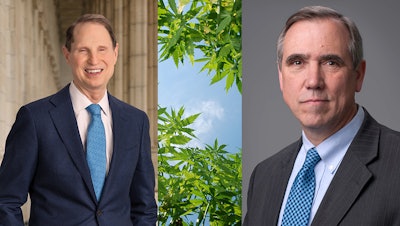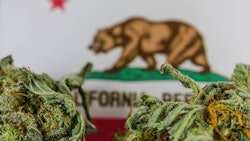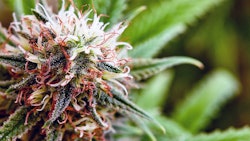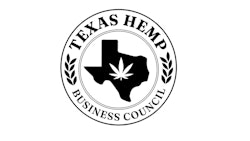
As the path forward for hemp-derived cannabinoid products remains uncertain at the federal level, eight Democratic senators sent a letter to party leaders Sept. 16, urging them to take up regulations instead of prohibition.
The letter, spearheaded by U.S. Sens. Ron Wyden and Jeff Merkley, both of Oregon, calls on Majority Leader John Thune, R-S.D., and Minority Leader Chuck Schumer, D-N.Y., to oppose any government funding bill that includes a provision to re-criminalize hemp THC products, which have flourished in the aftermath of the 2018 Farm Bill federally legalizing commercial hemp cultivation.
Instead, the Democratic letter writers are asking that the upper chamber’s leaders work together to consider legislation aimed at “fully” regulating hemp-derived products to improve consumer safety as an answer to the U.S. Food and Drug Administration’s failure to do so.
The letter is in response to the fiscal year 2026 Agriculture, Rural Development, Food and Drug Administration, and Related Agencies Appropriations Act, which initially included language to ban any hemp-derived products containing synthetic compounds and/or quantifiable amounts of THC or THCA, or other cannabinoids that have similar effects on humans or animals.
“We write to express strong opposition to the inclusion of any language in S. 2256 … or in any continuing resolution or conferenced spending bill that would decimate the American agricultural hemp industry and imperil states’ ability to prevent unsafe hemp-derived cannabinoid products from getting into the hands of children,” they wrote, calling attention to the 3,900 acres of hemp in Thune’s home state of South Dakota that depend on public policy.
“We agree that hemp-derived cannabinoid products, when left unregulated, present safety concerns,” they wrote. “But the original language in the FY26 Agriculture-FDA Appropriations Bill, particularly Sec. 781(1)(C)(ii)(III), recriminalized products currently prolific across the United States without any method to remove them from the stream of commerce. Instead of this hurried attempt that will not achieve its worthy public health and safety goals, we suggest considering legislation to establish a hemp-derived cannabinoid product framework.”
In addition to Wyden and Merkley, the letter was signed by Sens. Angela Alsobrooks, D-Md., John Hickenlooper, D-Colo., Cory Booker, D-N.J., Michael Bennet, D-Colo., Martin Heinrich, D-N.M., and Chris Van Hollen, D-Md.
They suggested a federal regulatory framework:
- restricts the sale and possession of hemp products to adults 21 or older;
- standardizes packaging and labeling to eliminate “look-alike” snack products that are appealing to children while allowing adult-only consumers to make informed choices;
- prohibits synthetic or artificially derived products (such as delta-8 THC); and
- requires independent third-party laboratory tests for consumable hemp-derived cannabinoid products to ensure safety.
While 27 members of the Senate Appropriations Committee unanimously approved the FY26 Agriculture-FDA Appropriations Bill in July to include the hemp THC prohibition language, that language was later removed when Sen. Rand Paul, R-Ky., threatened to block the entire $27-billion funding package from advancing.
Sen. Mitch McConnell, R-Ky., helped secure the now-removed language in an attempt to fix the unintended consequences of his 2018 Farm Bill, which he said was meant to provide farmers in Kentucky with an agricultural commodity for industrial hemp’s fiber and grain markets amid struggles in the state’s tobacco industry.
However, because of a loose definition for hemp in the 2018 legislation, intoxicating products derived or chemically produced from the plant’s flower have proliferated. The U.S. hemp industry now supports 320,000 American jobs, generates $28.4 billion in regulated market activity, and produces some $1.5 billion in state tax revenues, the eight Democrats wrote.
“While we appreciate the Appropriations Committee’s commitments to improve the language contained in the original FY26 Agriculture-FDA Appropriations Bill, the language in Section 782 of S.2256 (which was struck by a managers’ package amendment before final passage) falls short of a real solution,” they wrote. “If this language were to become law, it would deal a fatal blow to the American farmers, who are the foundation of the regulated hemp industry, and jeopardize tens of billions of dollars in economic activity around the country.”
While the federal government has failed to address the unintended consequences of the 2018 Farm Bill, many states have taken it upon themselves to regulate or ban hemp-derived cannabinoid products.
For example, Maryland regulators announced this week that they will start enforcing a law that prohibits businesses from selling intoxicating THC products without a cannabis license. California lawmakers are sending a bill to Gov. Gavin Newsom’s desk to prohibit synthetic THC products and integrate hemp-derived cannabinoid products into their cannabis program. And Texas Gov. Greg Abbott issued an executive order last week to regulate the products, including age-gating restrictions and the potential prohibition of synthetic cannabinoids and smokable hemp flower products.
A top priority for many elected officials is to provide guardrails to help avoid unintentional and intentional ingestion by America’s youth.
In addition to calling for protecting kids, the eight Democratic letter writers pointed to additional unintended consequences of re-criminalizing any “quantifiable” levels of THC, which McConnell proposed in July.
The Democratic senators suggested that the industrial hemp industry is interconnected among grain, fiber and cannabinoid products, and that the long-term success of American hemp farmers depends on all three markets.
“Re-criminalizing cannabinoid products cuts off one leg of the hemp market’s stool, and it will topple if this language is included in any final spending bill,” they wrote. “Over 70% of hemp acreage is dedicated to cannabinoid production, according to the latest USDA data—and hemp even yields higher profits for farmers compared to corn or soybeans.”
The Democratic senators also claimed that McConnell’s proposal would imperil the market for non-intoxicating hemp CBD products, suggesting it’s difficult for manufacturers to produce CBD products that are free of “trace” amounts of THC.
“By arbitrarily changing the definition of a crop to regulate finished products, Congress would effectively turn out the lights on America’s law-abiding hemp farmers and undermine ongoing work by our colleagues in authorizing committees and in states that have created regulatory frameworks for hemp products,” they wrote. “We will continue to stand up for American hemp farmers and small businesses and oppose efforts to include this language in any bill.”
























